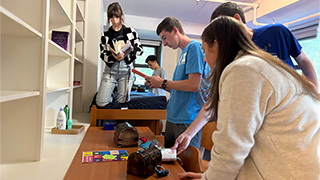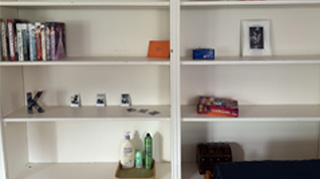Transforming Teaching Through Game-Inspired Learning
Tuesday, September 23, 2025

The Teaching, Learning and Technology Center (TLTC) is leading efforts to bring gamification into teaching and training at Seton Hall. By integrating game-inspired elements into the learning process, the TLTC is designing experiences that enhance engagement, foster collaboration and build real-world skills.
Ahead of the fall semester, the Department of Housing and Residence Life partnered with the TLTC to create an escape room experience for Head Residence Assistants (HRAs). The activity immersed HRAs in a fictional storyline about a missing resident assistant, challenging them to solve puzzles and follow clues to uncover the mystery. The escape room was inspired by the TLTC’s gamified project last year for the Division of Student Services and was further enhanced with guidance from Renee M. Cicchino, director of instructional design and training and Ann Oro, senior instructional designer at the TLTC.

"When I began brainstorming the escape room, Ann and Renee helped me shape the puzzles, suggested formats like chests and number patterns and even provided supplies from their earlier project," shared Kendra Sherman, assistant director of residence life, on how the idea developed. "The TLTC were wonderful partners in bringing this idea to life. I really just wanted the HRAs to bond during training, since many had not worked together closely before. This gave them a chance to explore their communication and leadership styles while having fun."
For the HRAs, the activity was more than just fun. HRA Matthew Schoner reflected, "Everyone who went through the room had something valuable to contribute and learn from others. I was able to think critically and develop my problem-solving skills, which I have been able to translate into situations that may be new and unfamiliar to me."
Gamification applies familiar elements of games, such as challenges, collaboration and rewards to education. For faculty, it creates opportunities to make lessons more interactive and to recognize achievement through engaging activities or digital badges and credentials. For students, it increases motivation, fosters teamwork and reinforces course concepts in lasting and memorable ways.
Faculty interested in exploring game-based approaches into their courses can connect with their instructional design liaisons or learn more about digital badges, available on the Seton Hall Badging website.
Categories: Science and Technology






